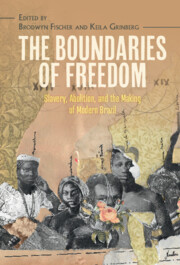Book contents
- The Boundaries of Freedom
- Afro-Latin America
- The Boundaries of Freedom
- Copyright page
- Contents
- Figures
- Tables
- Acknowledgments
- Introduction Slavery and Freedom in Nineteenth-Century Brazil
- Part I Law, Precarity, and Affective Economies during Brazil’s Slave Empire
- Part II Bounded Emancipations
- 6 Body, Gender, and Identity on the Threshold of Abolition
- 7 Slavery, Freedom, and the Relational City in Abolition-Era Recife
- 8 Migrações ao sul
- Part III Racial Silence and Black Intellectual Subjectivities
- Part IV Afterlives of Slavery, Afterwards of Abolition
- Bibliography
- Index
7 - Slavery, Freedom, and the Relational City in Abolition-Era Recife
from Part II - Bounded Emancipations
- The Boundaries of Freedom
- Afro-Latin America
- The Boundaries of Freedom
- Copyright page
- Contents
- Figures
- Tables
- Acknowledgments
- Introduction Slavery and Freedom in Nineteenth-Century Brazil
- Part I Law, Precarity, and Affective Economies during Brazil’s Slave Empire
- Part II Bounded Emancipations
- 6 Body, Gender, and Identity on the Threshold of Abolition
- 7 Slavery, Freedom, and the Relational City in Abolition-Era Recife
- 8 Migrações ao sul
- Part III Racial Silence and Black Intellectual Subjectivities
- Part IV Afterlives of Slavery, Afterwards of Abolition
- Bibliography
- Index
Summary
This chapter tells the stories of three young people, living in the northeastern city of Recife, on the cusp of freedom during Brazil’s last decade of slavery. Their stories unveil the malleability of Brazilian bondage in its last gasp but also place in sharp relief the limitations and contradictions of both urban freedom and liberal modernity in a city structured by slavery. In highlighting the continuity and intersectionality inherent in urban struggles for freedom, the chapter seeks to open windows on relational dynamics that shape cities across the globe.
- Type
- Chapter
- Information
- The Boundaries of FreedomSlavery, Abolition, and the Making of Modern Brazil, pp. 183 - 212Publisher: Cambridge University PressPrint publication year: 2022

